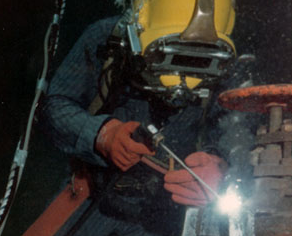Lawsuit blames BP's Gulf pollution for divers' injuries, suicides

A commercial diver who worked in the Gulf of Mexico following the BP disaster has filed a lawsuit blaming his serious health problems -- and his colleagues' suicides -- on the oil and chemical dispersants used to break up the slick.
David Hogan of Texas was once a "very gregarious, healthy man" who climbed 14,400-foot Mount Rainier in Washington -- but after five months of working long hours as a commercial diver in Gulf waters fouled by oil and chemical dispersants, he began suffering seizures, lost 60 pounds, can't walk, and is going blind, according to the complaint filed last week in district court in Houston:
"By August, 2011, medical testing and medical evaluation by one or more physicians familiar with exposure to the oil spill and, particularly, exposure to the Corexit® dispersants, led physicians to inform Mr. Hogan that his progressing medical problems were caused by the contact with the oil spill during his diving operations between June and November, 2010.
"Through additional testing and medical evaluation, by November 16, 2011, Mr. Hogan had been diagnosed as suffering from neurotoxicity 'related to chronic and cumulative exposure to chemical and heavy metals associated with the Gulf oil spill and dispersant.'"
Hogan worked for Specialty Offshore, which contracted with oil and gas companies operating in the Gulf of Mexico to perform jobs including repairing and maintaining oil and gas lines.
During his first dive following the BP spill in June 2010, Hogan noticed that the oil had sunk deeper into the Gulf waters than he had ever seen while working previous oil spills, according to the complaint. He immediately returned to the surface and noticed that his wetsuit also looked unusual. He contacted the onsite supervisor for ConocoPhillips, the company he was diving for, and that person gave him a number for a BP hotline.
Hogan spoke by phone to a BP representative, who told him there was nothing to worry about. Soon after, one of BP's health and safety specialists visited the ConocoPhillips platform via helicopter and told Hogan and the rest of the dive team that there was no need for special hazardous-materials diving gear.
Based on those assurances, the divers worked as many as 20 hours per day for the next couple of weeks in heavily contaminated water. One diver began experiencing health problems while the work was still underway, and eventually the entire dive team developed health problems. Two of the divers have since committed suicide, according to the lawsuit.
Exposure to crude oil can cause cancer as well as damage to the liver, kidneys, blood, and nervous, immune, respiratory and reproductive systems. Corexit dispersants contain hazardous substances include 2-butyoxyethanol, petroleum distillates and sulfonic acids, and has been banned for use on oil spills in the United Kingdom for over a decade.
Hogan is not the first diver who worked in the Gulf of Mexico to claim his health was damaged by pollution from the BP oil disaster: A team of three scientific divers with the nonprofit EcoRigs worked in the area following the spill and experienced health problems including bloody stools, bleeding from the nose and eyes, nausea, diarrhea, stomach cramps, dizziness and confusion. Blood tests eventually revealed high levels of toxic ethyl benzene and xylene in their blood.
The companies named in Hogan's suit are BP, Halliburton and Transocean, which were involved in the failed Deepwater Horizon well; Nalco, the manufacturer of the Corexit chemical dispersants used on the BP spill; and Specialty Offshore, ConocoPhillips, Xplore Oil and Gas ad Stuyvesant Dredging, for whom Hogan did diving work.
(Photo of diver from Specialty Offshore's website.)
Tags
Sue Sturgis
Sue is the former editorial director of Facing South and the Institute for Southern Studies.
